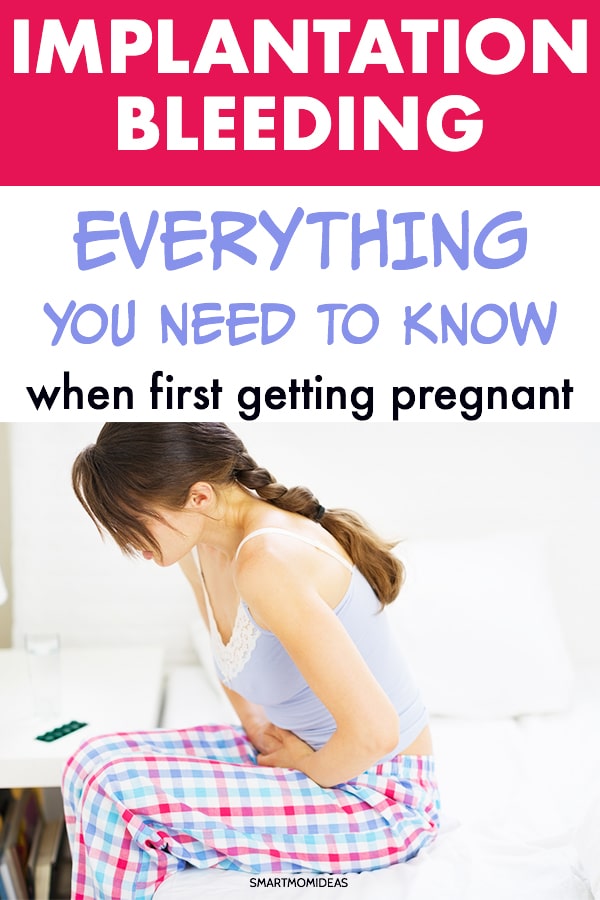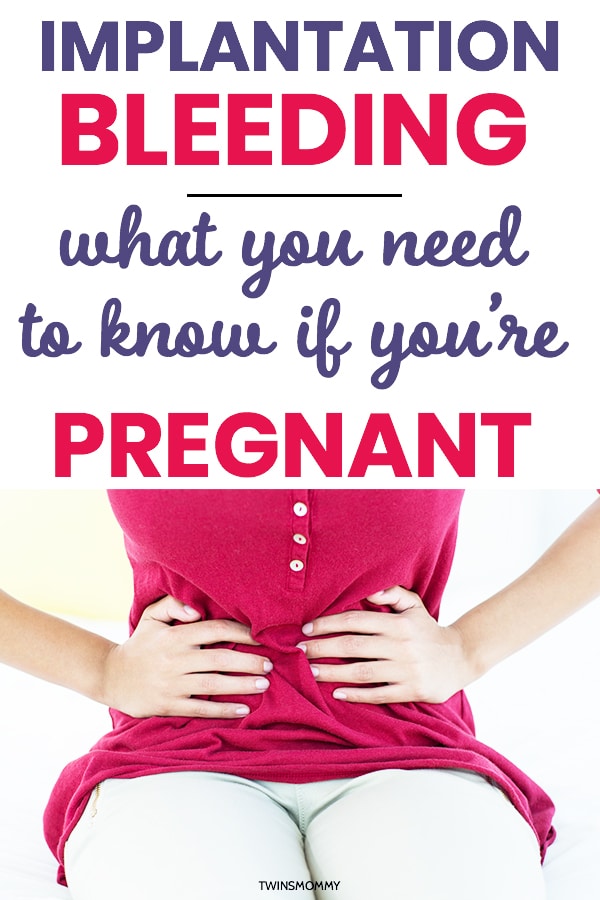What you need to know about implantation bleeding if you are newly pregnant.

You time your periods very carefully.
You know exactly when Aunt Flow is supposed to be arriving.
No surprises, tampon in hand!
But what happens when you get, what you think is your period, early?
You go to the bathroom because you feel something is off. Only to realize that you are bleeding, but it looks different.
This doesn’t look like normal period blood, but you go about your day not thinking much of it.
What you might not realize is your body has just given you its first sign that you have conceived and are now with child.
This is known as implantation bleeding.
It is understandable how many women could mistake this first sign of pregnancy as just some normal spotting, however, it is so much more than that!
What is Implantation Bleeding?
Implantation bleeding takes place when a fertilized egg attaches to the wall of the uterus in order to prepare to grow a baby.
Approximately one-third of woman experience implantation bleeding as an early sign of pregnancy. It is completely normal and is nothing you should worry about.
I had implantation bleeding when I became pregnant!
The problem, or should I say confusion, that happens with implantation bleeding is that it happens very close to your normal menstrual cycle.
Therefore, if you are not trying to conceive or don’t have regularly spaced out periods, then implantation bleeding can very easily be mistaken for a normal menstrual cycle.
If you and your partner are trying to conceive, then it might be a good idea to track your ovulation and menstrual cycles with a journal.
Keeping track of your ovulation, menstrual cycles, and when you have intercourse can help you to determine if you are experiencing implantation bleeding rather than just a normal period.
Understanding the Signs and Symptoms
Signs and symptoms of implantation bleeding can be very similar to those of a normal menstrual cycle.
Knowing and trusting your body is the first step in determining what type of bleeding you are experiencing.
1. Know Your Body
It is very important, especially as women, to know our bodies and what is normal for your body.
We are our first line of defense in any type of healthcare prevention. If you don’t already pay close attention, you should be conscious of the happenings in your body.
I know this might sound gross but check your panties. Does the blood on there look different?
Implantation bleeding is generally a lot lighter in color and is a very light flow.
It can last only a few hours or even just be one spot and done. Often times women who have conceived don’t even realize they are experiencing implantation bleeding.
Whereas menstrual blood is often very dark red in color, implantation bleeding can be very light pink or even a darkish brown.
Many women might also experience clotting in their menstrual blood, this is not present in implantation bleeding. If you think you might be experiencing implantation bleeding, schedule a doctor appointment at your earliest convenience.
2. It’s About Timing
If you are one of those women who can set a clock by your periods, it might be very easy to tell that the spotting you are seeing is not your normal period.
Implantation bleeding can occur very close to when your normal menstrual cycle is supposed to occur.
It will generally start 6-12 days after conception, whereas a menstrual cycle will generally take place 11-14 days after ovulation.
If you haven’t had sex in a month or more, then it is highly unlikely that you are pregnant and are experiencing implantation bleeding.
However, if you have recently engaged in intercourse, then you might want to make a trip to your gynaecologist to confirm if you are pregnant.
3. Cramping
Many women experience cramping during their periods. Often times it can be extremely painful.
If you are experiencing implantation bleeding, you might still experience cramping due to the egg attaching to the uterine wall, although it might be much less painful than normal.
If cramping continues to worsen, that might then indicate that you are experiencing a menstrual period rather than implantation bleeding.
If you experience any other symptoms, such as chills, fever, very bad cramping on one side of your abdomen, or irregular heavy bleeding, then you should contact your doctor immediately.
4. Other Signs of Pregnancy
The female body is very miraculous. It is simply amazing how quickly our bodies change in preparation for growing a human.
Most sensitive pregnancy tests can indicate a positive pregnancy about 8 days after conception. However, implantation bleeding can also be an early indicator of a pregnancy.
Other early signs of pregnancy can include nausea (morning sickness), sore breasts, abnormal fatigue, constipation, uncharacteristic mood swings, or dizziness.
Or…those could just be your normal PMS symptoms.
When Implantation Bleeding Might be Cause for Concern
Most often if you experience implantation bleeding, there is no need to worry but rather celebrate your little bundle of joy.
It is simply an early sign of pregnancy and will have no ill effects on the baby.
However, if you are experiencing other symptoms, such as chills, fever, and extreme cramping on one side, then it is time to go see your doctor.
This could potentially indicate an ectopic pregnancy.
If you are experiencing what you feel is implantation bleeding, then you should wait 3-5 days before peeing on that stick.
I know, that might seem impossible to wait that long, but if you are indeed pregnant, it is more likely that you will get an accurate test as the “pregnancy hormone” hcG has had time to develop and become detectable on home pregnancy tests.
It is not normal, however, to have bleeding during a pregnancy beyond implantation bleeding.
About half of women who experience some type of bleeding during their pregnancies go on to have a perfectly normal and healthy pregnancy.
Bleeding during pregnancy can occur from irritation of the cervix (like after an OBGYN visit), tearing or irritation from sex, a vaginal infection, or strenuous lifting.
Make sure to consult your doctor with any concerns you might have, especially if you are experiencing bleeding anytime during a pregnancy.
What’s Next
Implantation bleeding can be a sign of early pregnancy, however, it is not always an indicating factor. It is possible to experience what might look like implantation bleeding without actually being pregnant.
If you are trying to get pregnant, you can keep an eye out for implantation bleeding, but do not take it as a determining factor.
If you think you are experiencing implantation bleeding, wait a few days and take a test.
If you are still unsure, schedule an appointment with your OBGYN to be sure.
Please remember to pin me!





Leave a Reply